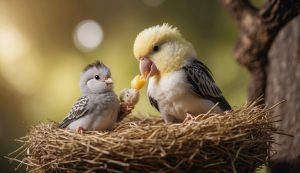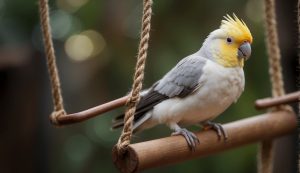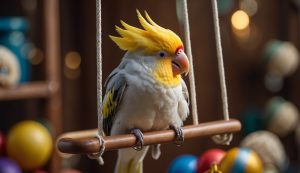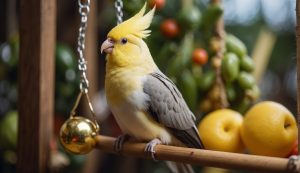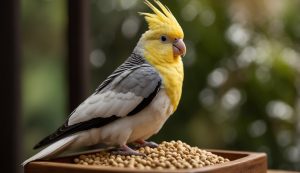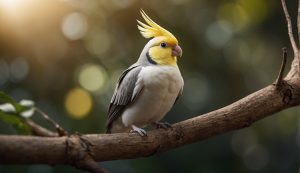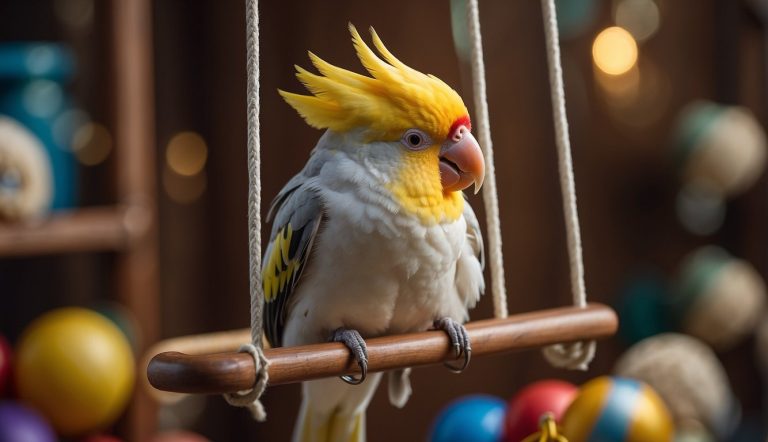How to Care for Sick Cockatiel: Essential Tips for Recovery

Caring for a sick cockatiel is both a challenging and rewarding responsibility. When my cockatiel started to show signs of illness, the first thing I did was to become vigilant in observing its symptoms and behaviors.
Recognizing that prompt and proper care is crucial, I made sure to seek veterinary advice to ensure the best possible outcome for my pet. Expert guidance helped me to understand the illness and deliver the appropriate care my feathered friend needed.
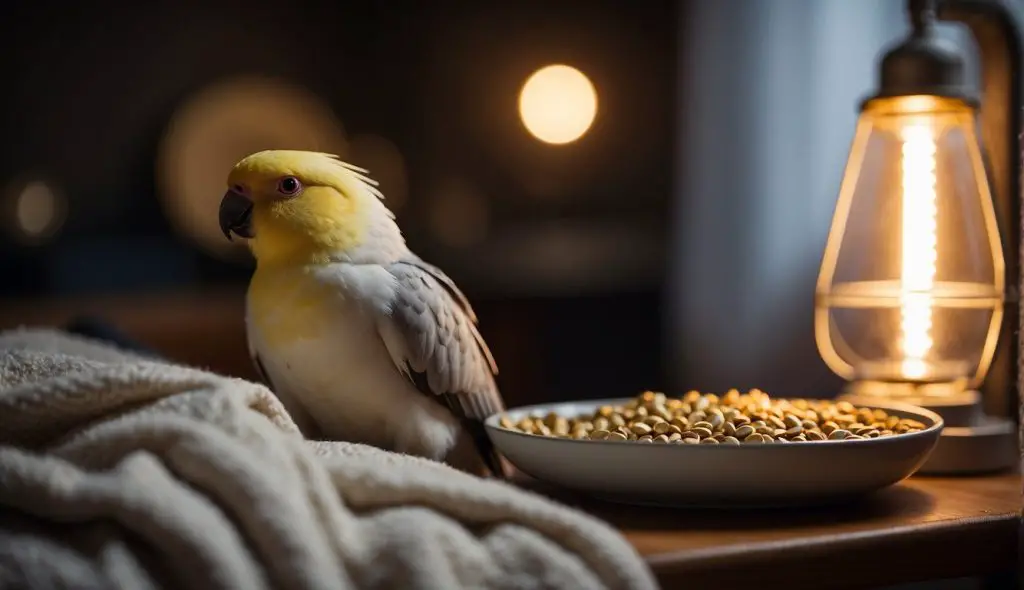
Creating a nurturing environment is essential for a cockatiel’s recovery. In my experience, it’s important to provide a comfortable and safe space for the bird, which can make a significant difference in their healing process. Adjusting the habitat to reduce stress and monitoring their food and water intake becomes a top priority. Additionally, following a vet-prescribed treatment plan, coupled with gentle care at home, improves the chances of a full recovery.
Key Points
- Immediate vet care is vital for a sick cockatiel’s recovery.
- A stress-free environment supports the healing process.
- Consistent home care is essential for a cockatiel’s health.
Table of Contents
Recognizing Symptoms and Seeking Veterinary Care
I know how worrying it can be to suspect that your beloved cockatiel might be unwell. It’s essential to recognize the signs of illness early and understand when to seek professional care from an avian veterinarian.
Identifying Common Symptoms of Illness
Weight Loss: I monitor my cockatiel’s weight consistently, as sudden weight loss can be a sign of sickness. A kitchen scale can be useful for this.
Lethargy: If I see my cockatiel is less active or showing disinterest in activities, it could indicate illness.
Respiratory Issues: Sneezing, coughing, or difficulty breathing are symptoms I watch for closely.
Eye Discharge or Conjunctivitis: Presence of discharge or inflammation around the eyes warrants immediate attention.
Change in Droppings: Diarrhea or changes in consistency and color of the droppings tell me something might be wrong.
Feather Plucking or Ruffled Feathers: Unusual feather condition is often a sign of distress or discomfort.
Behavioral Changes: Tremors, uncoordinated movements, or reduced appetite point to potential health issues.
Vomiting or Regurgitation: I keep an eye out for any vomiting or signs of nausea.
Understanding When to Consult an Avian Veterinarian
When I notice any of the above symptoms persisting or worsening, it’s time to consult an avian veterinarian. Coughing, difficulty breathing, and lethargy are particularly concerning and prompt me to get immediate help. If my cockatiel has been exposed to other birds or has a history of illnesses like psittacosis, giardia, or fungal infections, I take that very seriously.
Regular Check-Ups: I believe in preventive care, so I schedule regular check-ups with an avian vet to catch any early signs of common diseases.
Immediate Consultation: For acute symptoms like respiratory distress, significant weight loss, or changes in behavior, I don’t hesitate to seek immediate veterinary intervention.
Diagnostic Tests: An avian vet may recommend tests such as blood samples or saliva analysis to diagnose conditions like bacterial infections or fatty liver disease.
Taking care of a sick cockatiel can be quite complex, so I always ensure that I’m well-informed and ready to act swiftly to safeguard the health of my pet bird.
Creating a Supportive Environment for Recovery
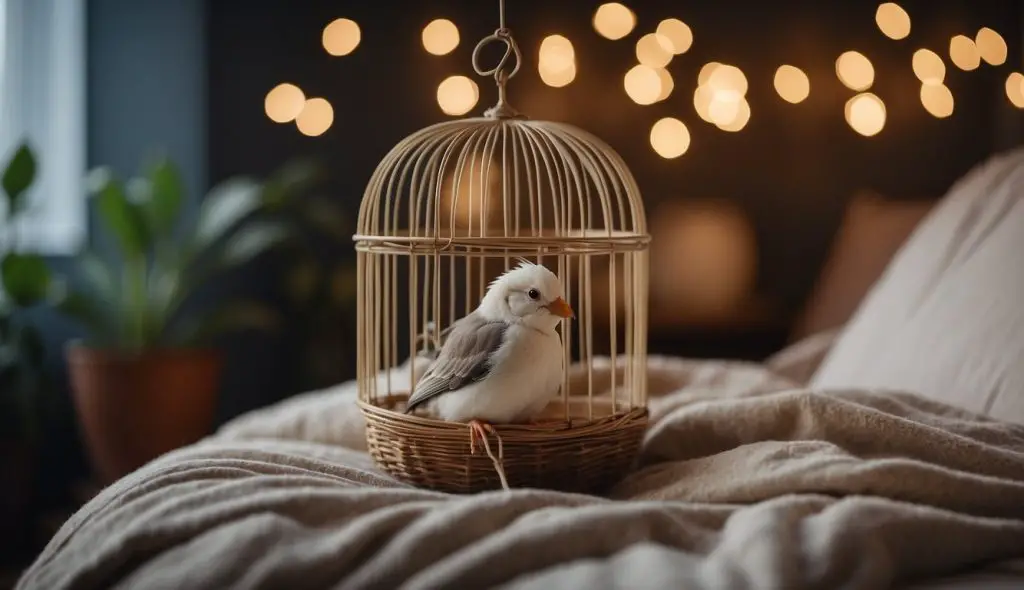
In my experience, ensuring a nurturing habitat that promotes the health and speedy recovery of a sick cockatiel involves attention to detail in three critical areas: a restful sick room setup, a tailored diet, and consistent hydration.
Setting Up a Comfortable Sick Room
I create a serene recovery space for my sick cockatiel by maintaining a quiet and warm environment, typically around 85°F to help conserve their energy for healing. Soft, indirect lighting is important to reduce stress, while also allowing for a natural day-night cycle to encourage restful sleep.
- Temperature: 85°F (29.4°C) to conserve energy.
- Lighting: Soft and indirect, mimicking natural cycles.
Adjusting Diet and Nutrition for a Sick Cockatiel
For a cockatiel under the weather, I adjust their diet to ensure they’re getting the necessary nutrients without strain. I offer a mix of easy-to-digest pellets, and I’m careful to include soft fruits and vegetables for variety and additional vitamins.
- Food: Easy-to-digest pellets, soft fruits, and vegetables.
- Supplements: As recommended by a vet for specific health needs.
The Role of Hydration and Fresh Water
Hydration is crucial. I always provide my cockatiel with fresh water throughout the day, replenishing it frequently to encourage drinking and to flush out any toxins. But I make sure that the water is not too cold, as this can be a shock to their system.
- Water: Fresh and regularly replaced, not too cold.
- Availability: Constant access to encourage drinking.
Administering Treatment and Home Care
When my cockatiel falls ill, I know that the proper administration of medication and creation of a supportive home care environment are crucial for its recovery. I’ll guide you through understanding medications and remedies, as well as monitoring and managing symptoms at home, with clear and practical steps.
Understanding Medication and Remedies
I always ensure I have a clear understanding of any medication my vet prescribes. Dosage and timing are critical, as is administering them correctly. If my cockatiel needs oral medication, I use a small syringe or dropper. For topical treatments, I apply them directly to the skin or feathers as instructed. Here’s a checklist I follow:
- Verify the correct medication name and dosage.
- Understand the frequency and duration of treatment.
- Learn the proper method for administering each medication.
It’s important to never use over-the-counter remedies without my vet’s approval, as some can be harmful to birds. Additionally, a humidifier can sometimes aid in providing relief for respiratory symptoms, but again, I always consult my vet first.
Monitoring and Managing Symptoms at Home
To effectively monitor my cockatiel’s symptoms at home, I keep it in a quiet and warm environment, often referred to as a ‘sick room’. I maintain a consistent temperature and use a humidifier if recommended, which can help ease breathing difficulties. My vigilance is key in observing changes in behavior or symptoms, and I note them for discussion with my vet. I watch for:
- Changes in appetite or water consumption.
- Breathing difficulties or changes.
- Variances in droppings.
I also ensure that my cockatiel continues to eat and drink, even if that requires hand-feeding or offering favorite foods. Supportive care is just as vital as medication, and I always follow through with my vet’s advice to provide the best possible outcome for my feathered friend.
Preventing Illness Through Proper Cockatiel Care
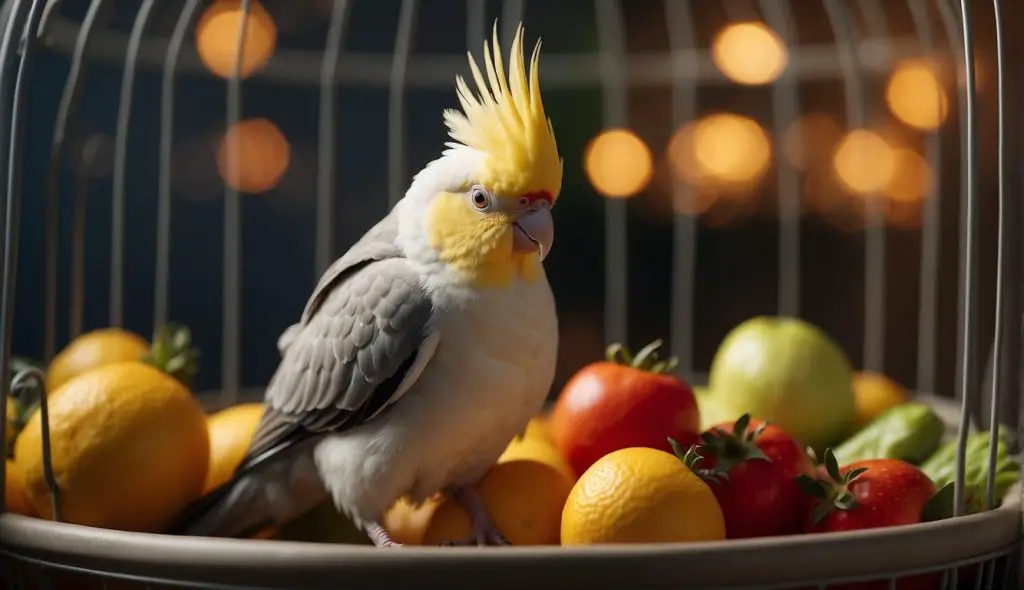
I know that keeping my cockatiel healthy involves more than just responding to illnesses as they occur—I need to take preventative steps to ensure that they stay in top health. Regular health checks and engaging activities play a crucial role in this.
Regular Health Checks and Preventative Measures
I always make it a habit to observe my cockatiel daily for any signs of abnormal behavior or tail bobbing that could indicate illness. I look for changes in:
- Appetite: A sudden lack of interest in food can be a sign of illness.
- Droppings: Changes in the color and consistency can indicate health issues.
Each month, I schedule a “wellness check” where I:
- Gently examine their feathers, beak, and nails.
- Weigh them to monitor for any unexpected weight loss or gain.
I also make sure all vaccinations are up-to-date and protect my cockatiel from potential airborne contaminants. Additionally, cleanliness is paramount, so I:
- Regularly clean and disinfect their cage and perches.
- Replace food and water daily to prevent the spread of bacteria.
The Importance of Mental and Physical Stimulation
Mental and physical stimulation is essential to prevent stress and boredom in cockatiels, which can lead to health problems. I provide a variety of toys and rotate them regularly to keep my cockatiel engaged. Toys suitable for cockatiels include:
- Foraging toys: to stimulate their natural foraging instinct.
- Chew toys: to help maintain their beak health.
In terms of physical activity, I’ve found that training and flying time are indispensable for my cockatiel’s well-being. My approach includes:
- Training sessions: These not only strengthen our bond but also provide mental stimulation.
- Sufficient out-of-cage time: It’s vital for their physical health to fly and explore in a safe, bird-proofed area.
Regular interaction with my cockatiel not only serves as a time for bonding but is also an opportunity to assess their health and happiness on an ongoing basis.
Frequently Asked Questions
Identifying and responding to signs of illness in cockatiels is crucial to promote a swift recovery. Here are some common questions and answers to help you care for your feathered friend.
What are the signs of illness in cockatiels?
As a cockatiel owner, I watch for signs of illness, such as changes in vocalization, appetite, or droppings. Lethargy, fluffed-up feathers, and discharge from the nostrils or eyes are also key indicators that my bird may be unwell.
What should you feed a cockatiel that isn’t feeling well?
When my cockatiel doesn’t feel well, I offer foods high in nutrition and easy to digest, like warm cooked rice or oatmeal. I also ensure that fresh water is always available.
Can you provide home remedies for treating a sick bird?
I’m cautious with home remedies as they’re not a substitute for professional care. However, keeping my sick cockatiel warm and calm can help. For minor issues, a bit of pureed pumpkin can aid digestion, but I always consult my vet first.
When is it necessary to seek veterinary care for a sick cockatiel?
I don’t hesitate to seek veterinary care if my cockatiel’s symptoms persist or worsen. Unusual droppings, breathing difficulties, or a change in weight are definite signals for professional help.
How do you provide comfortable accommodations for a cockatiel that is unwell?
I ensure that my bird’s cage is in a warm, quiet area away from drafts. Sometimes, I’ll place a clean towel at the bottom of the cage for extra comfort and to monitor droppings more easily.
Is it possible for a bird to recover from illness without intervention?
Some minor illnesses can pass without intervention, yet I monitor my cockatiel closely if I suspect it’s unwell. For any serious concerns or prolonged symptoms, intervention from a vet is typically necessary to facilitate recovery.

